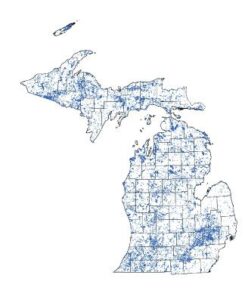MAC releases huge survey report on opioid settlement funds
 MAC is excited to announce the updating of the MAC Opioid Settlement Dashboard and the release of the Michigan County Opioid Settlement Reporting: Data Overview.
MAC is excited to announce the updating of the MAC Opioid Settlement Dashboard and the release of the Michigan County Opioid Settlement Reporting: Data Overview.
The Michigan County Opioid Settlement Reporting: Data Overview and the related MAC Opioid Settlement Dashboard are the product of months of work with Michigan’s 83 counties, which are now in the process of deploying millions of dollars derived from various legal settlements with drug manufacturers. Between now and 2040, those settlements will result in $800 million for Michigan counties.
“This is the first and only comprehensive picture of what is happening at the county level in Michigan,” said MAC Executive Director Stephan Currie. “It results from our ongoing partnership with Vital Strategies, a global public health organization, to aid our members to make the most of this historic opportunity to aid those struggling with substance use disorder.”
Data included on the dashboard and in the report are pulled from the Annual Opioid Settlement County Reporting Survey. The survey was administered between April and May of 2024 and was intended to capture data associated with calendar year 2023. Information collected included county activities associated with planning efforts, stakeholder engagement, management of funds and spending.
“Most counties are focused on thoughtful planning efforts to ensure funds are used in meaningful ways while understanding the urgency of drug overdose crisis,” said Amy Dolinky, the technical adviser who led the survey work. MAC is expecting to do annual surveys to gauge changes over time and continued updating of the dashboard and reporting.
Seventy-seven percent of counties responded to the survey, allowing for the most comprehensive picture of local government efforts associated with opioid settlement funds available.
County leaders can learn more about the report and the latest on opioid planning by attending the 2024 Policy Summit on June 25 in Lansing or via Zoom. For details, including registration, click here.
For questions or for technical assistance, contact Amy Dolinky at dolinky@micounties.org.
Economic development vote pulls rug out from under locals
 A huge state fund for community investments, accessible by counties and others, was suddenly and unexpectedly eliminated from legislation in a House committee this week.
A huge state fund for community investments, accessible by counties and others, was suddenly and unexpectedly eliminated from legislation in a House committee this week.
The House Committee on Economic Development and Small Business adopted substitute bills that eliminate the proposed “Michigan 360” program.
The prior versions of Senate Bills 559, by Sen. Mallory McMorrow (D-Oakland) and 562, by Mary Cavanaugh (D-Wayne) would have created “Michigan 360” as part of a revamp of the Strategic Outreach and Attraction Reserve (SOAR) Fund. “Michigan 360” would have dedicated funds for local housing, infrastructure, regional transit, job training, business assistance and child care development.
The state’s current economic development programs, which traditionally have focused on winning large corporate investments, have been criticized in recent years because the return on investment was unclear and because they failed to recognize the needs of the communities the companies were going in to.
MAC opposes the abandonment of the Michigan 360 program and sees it as a step backward for economic development. Businesses need talent and talent needs attractive, functional and affordable places to live, work and play. This turn of events is likely due to continued budget negotiations and concerns over the amount of funds available for the program.
MAC will continue to urge restoration of the program as the bills move through the legislative process.
For more information on this issue, contact Deena Bosworth at bosworth@micounties.org.
Contentious election bills advance in Senate on party-line vote
 An amended version of the “Michigan Voting Rights Act,” Senate Bills 401-404, passed the Senate Elections and Ethic Committee this week with all Democrats voting yes and Republican members voting no. The bills are meant to bolster federal law and voting rights in the state for members of a protected class and for disabled electors and locals have expressed support for this concept. However, the practical implementation and potential legal liability are quite troublesome for county governments.
An amended version of the “Michigan Voting Rights Act,” Senate Bills 401-404, passed the Senate Elections and Ethic Committee this week with all Democrats voting yes and Republican members voting no. The bills are meant to bolster federal law and voting rights in the state for members of a protected class and for disabled electors and locals have expressed support for this concept. However, the practical implementation and potential legal liability are quite troublesome for county governments.
Under the initial proposal, a member of a protected class could file a complaint with a local unit of government if they felt impaired from participating in elections or the political process. Many of the listed impairments are beyond the control of a local government or conflict with existing election laws.
MAC participated in workgroups with bill sponsors, Senate policy staff, clerks and other local government associations. Many changes were made, including the creation of a fund for the reimbursement of legal fees, softer language to ensure malintent is evident and certain stipulations for meetings between plaintiffs and defendants.
MAC appreciates the many concessions that sponsors made in acknowledgement of county concerns. However, MAC does not have a position on the bills, as we remain uneasy about exposing locals to frivolous legal challenges and placing additional burdens on local clerks. The bills are expected to be scheduled for a full Senate prior to the Legislature’s summer recess.
For more information on this issue, contact Madeline Fata at fata@micounties.org.
MAC joins call to reset state course on mental health services
 A state plan to alert delivery of mental health services should be considered, MAC and one of its affiliates said this week.
A state plan to alert delivery of mental health services should be considered, MAC and one of its affiliates said this week.
The Michigan Department of Health and Human Services (MDHHS) has proposed new requirements for those utilizing mental health services through the public mental health system. These proposals, a result of the federal Conflict Free-Access and Planning (CFAP) guidelines, would create service delays, additional costs to providers and barriers to access for individuals seeking care from the public mental health system.
County commissioners may receive requests from their local Community Mental Health organization or PIHP to adopt resolutions opposing the proposed changes regarding CFAP from MDHHS and urging collaboration between MDHHS and the Community Mental Health Association of Michigan (CMHA), a MAC affiliate. (Download a CMHAM resolution template here.)
CMHA’s alternative to MDHHS’ plan better fits the needs of Michigan’s public health system and its patients.
For more information on this issue, contact Samantha Gibson at gibson@micounties.org.

Map of inland lakes
Bill to ease county burden on setting lake levels advances
Legislation to help counties streamline the setting of inland lake levels advanced to the House floor this week.
Senate Bill 662, by Sen. Rosemary Bayer (D-Oakland), which cleared the House Committee on Natural Resources, Environment, Tourism and Outdoor Recreation this week, redefines “normal lake level” to allow for temporary fluctuations caused by weather conditions and water control structure construction or repair activities. The current statute and recent court decision to require counties to maintain a static lake level or to petition circuit courts to amend lake level orders when deviations occur result in a time-consuming and costly process.
SB 662 would improve this process by retroactively changing the definition to include the variations. By broadening the definition, counties and lake level districts should be able to avoid unnecessary lawsuits and repeated court proceedings, ultimately conserving both financial and administrative resources. The bill is supported by the Michigan Association of County Drain Commissioners, a MAC affiliate, and the Michigan Department of Energy, Great Lakes and Environment.
There are 62,798 inland lakes in Michigan with a surface area of at least 0.1 acres or larger. Michigan enjoys 1,300 square miles of inland lakes or 1.3 percent of Michigan’s total area. (mymlsa.org)
For more information on this issue, contact Deena Bosworth at bosworth@micounties.org.
Counties would gain flexibility on drain maintenance under bill before House
 Legislation to ease financial limitations on the maintenance of drains was voted out of a House committee this week.
Legislation to ease financial limitations on the maintenance of drains was voted out of a House committee this week.
The House Committee on Local Government voted out House Bill 5188, by Rep. Amos O’Neal (D-Saginaw), which increases the statutory cap on drain maintenance. Current law limits the amount of maintenance work drain commissioners can perform on a single drain in a year to $5,000 per mile. This bill would raise that to $10,000 per mile per year and then allow the cap to rise with inflation each year.
The rise in construction costs and the impact of extreme weather events necessitate the increase, argue advocates. Whether the existing drainage system is an open channel ditch/watercourse or an enclosed underground system, much of the necessary maintenance of drainage infrastructure cannot be efficiently done now, causing drain commissioners to maintain smaller sections each year and redeploying equipment and personnel in subsequent years to properly maintain the drain.
HB 5188 now moves to the House floor.
For more information on this issue, contact Deena Bosworth at bosworth@micounties.org
Podcast 83: County hiring legislation, mobility funding in the spotlight
 While the Legislature’s work on the fiscal 2025 state budget remains behind closed doors, MAC’s advocates at the State Capitol have been shepherding forward policy reforms to boost county hiring, investments in public services and assist jurors.
While the Legislature’s work on the fiscal 2025 state budget remains behind closed doors, MAC’s advocates at the State Capitol have been shepherding forward policy reforms to boost county hiring, investments in public services and assist jurors.
Podcast 83 host Stephan Currie and guests Deena Bosworth, Madeline Fata and Samantha Gibson engaged in a wide-ranging discussion on policy in Lansing in the podcast’s newest episode on June 11.
County hiring legislation
“(House Bill 5203) would allow those counties that have their own retirement system that are not a member of MERS … to rehire sheriff’s people for the sheriff’s department. And MAC was supportive of the endeavor (since) all those counties that are in the MERS system already have that ability. But it was those 13 counties that are not in that system that this would extend that ability to them,” Bosworth explained.
MAC worked to expand the legislation, though, so it can be used to bolster employment in other departments. “There are situations where you’ve got experts who have retired and the county really needs to bring them back without any significant limitations on it,” Bosworth noted.
MAC’s expectation is HB 5203 will clear the Senate committee this week and may reach the governor’s desk for signature before the Legislature leaves Lansing for the summer.
Economic/public investment strategies
The lion’s share of legislative attention in Lansing right now surrounds a Democratic proposal to revamp the state’s economic development strategic into a two-pronged approach that could mean billions of dollars for mobility investments by local governments.
The complicated legislative package involves bills from both the Senate (SBs 599/562) and House (HBs 5768-70) that are “tie-barred,” or required to move together.
A major portion of the work of interest to MAC, “Michigan 360,” was suddenly and unexpectedly junked this week, Bosworth said.
What remains is the “Michigan Mobility Trust Fund,” which would be provided with $200 million a year for 10 years, for total of $2 billion. Local governments will be eligible for these funds, as would regional transit authorities and public transportation providers.
Juror compensation
“So, a while back, a jury reform task force met and came up with a set of policy recommendations,” said Gibson. “House Bills 5689-5693 do a wide variety of things to reform the jury process; but most importantly to counties is the bills would increase the hourly rate that you would receive as a juror, and it ties it to minimum wage.
“That in and of itself, not an issue. The issue lies in what’s called the juror compensation fund. That is quickly dwindling. … So, when you have an ever-decreasing pot of money, and an attempt to increase the hourly rate that jurors are receiving, it begs the question: Who is then responsible for making up the difference? …
“(M)y goal is to ensure that that responsibility does not fall onto the county,” Gibson added.
Negotiations continue on the bills, which won’t be taken up until the fall.
View the full episode, recorded on June 11, by clicking here.
Previous episodes can be seen at MAC’s YouTube Channel.
And you always can find details about Podcast 83 on the MAC website.
Asset council seeks award nominees
 The Michigan Transportation Asset Management Council (TAMC) is seeking agencies and individuals to recognize for their efforts in asset management and best practices.
The Michigan Transportation Asset Management Council (TAMC) is seeking agencies and individuals to recognize for their efforts in asset management and best practices.
The TAMC has established the Organizational Achievement Award to acknowledge those agencies that have incorporated the principles of asset management and adopted an asset management plan to help guide their investment decisions. In addition, the TAMC Awards Program provides agencies around the state with excellent examples to establish their own programs and practices. All Public Act 51 road agencies are eligible to be nominated for this award.
The TAMC also wants to recognize individuals providing outstanding support of asset management and the TAMC. Nominees for the Carmine Palombo Individual Achievement Award can include elected officials (state or local), support staff from state agencies, regional and metropolitan planning organizations, county road agencies, local units of government, the education community or other individuals involved in promoting asset management in Michigan.
MAC and its members are represented on the TAMC by Kelly Jones, managing director of the Ingham County Road Department.
Submissions are due on June 21, 2024, to Gloria Strong, TAMC departmental technician, at Strongg@Michigan.gov. Direct questions to 517-402-3599.
 Staff picks
Staff picks
- Genesee County program successfully tackles student absenteeism with community support (MidMichiganNow.com)
- Michigan bottlers still get free water, despite governor’s tough talk (Bridge Michigan)
- A Michigan city ended low-level traffic stops. Now the county could follow. (Boltsmag)
- San Diego County to open new affordable housing for older adults amid overwhelming demand (San Diego Tribune)
